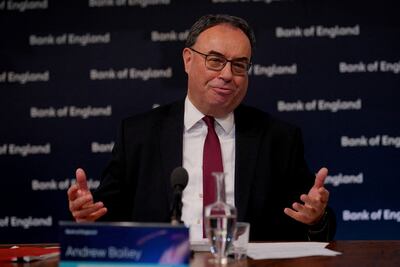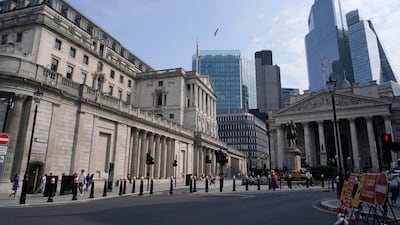The Bank of England has cut UK interest rates by 0.25 per cent to 5 per cent, the first downward movement to rates since March 2020.
The move comes after the bank’s Monetary Policy Committee (MPC) had kept interest rates at a 16-year high for almost a year.
Headline inflation in Britain had met the Bank of England’s 2 per cent target in May and June, and despite some economists noting inflation in the services sector was still running at 5.7 per cent in June, the MPC opted to reduce interest rates.
The US Federal Reserve left interest rates on hold at 5.25-5.5 per cent on Wednesday, but indicated that a cut would come in September.
Members of the MPC voted 5-4 in favour of the rate cut.
Bank of England governor Andrew Bailey, along with Sarah Breeden, Swati Dhingra, Clare Lombardelli and Dave Ramsden voted in favour, while Megan Greene, Jonathan Haskel, Catherine Mann and Huw Pill voted to maintain the rates at 5.25 per cent.
"The key element behind the decision to cut is possibly the replacement of [Ben] Broadbent by new MPC member Lombardelli, who has today voted to cut rates, while Broadbent was previously in the camp keeping rates on hold," said Stuart Cole, chief macroeconomist at Equiti Capital.
"It does raise the question that interest policy is decided just as much by who you put on the MPC as by the data itself."
Nonetheless, Mr Bailey said inflationary pressures had "eased enough that we've been able to cut interest rates today".
He added that MPC members needed to "make sure inflation stays low and be careful not to cut interest rates too quickly, or by too much".
'Mixed evidence'
UK interest rates rose quickly from late 2021 to a peak of 5.25 per cent in August last year, before remaining there for 12 months.
The British pound dropped 0.7 per cent against the US dollar and 0.3 per cent against the euro directly after the rate announcement.
Alpesh Paleja, interim deputy chief economist at the Confederation of British Industry, noted the tightly split vote suggests "mixed evidence that inflation persistence has been defeated".
“We still think that today’s meeting marks the start of a rate-cutting cycle, but the pace of this is now more uncertain," he said.
"Several MPC members will be looking for more definitive signs of inflation persistence easing, to be swayed towards reducing rates further."
As such, economists are now speculating on the timing and direction of the next move to interest rates.
"Inflation has the potential to nudge upwards later in the year when declines in energy prices in 2023 fall out of the annual comparison, while Chancellor Rachel Reeves’s public-sector pay rises could also have an inflationary effect, so the Bank of England may be cautious on the timing of its next rate move," said Alice Haine, personal finance analyst at Bestinvest by Evelyn Partners.
For Ruth Gregory, deputy UK economist at Capital Economics, the Bank of England will reduce rates more significantly than many are forecasting over the next 12 months.
"We still think that a fading in services inflation and below-target CPI inflation will prompt the bank to cut rates to 4.50 per cent by the end of this year and 3 per cent next year, rather than 3.75 per cent as markets expect," she said.
"That said, if we are wrong it’s likely to be because rate cuts are slower and smaller than we currently expect."
However, Anna Leach, chief economist of the Institute of Directors, is not expecting much in the way of rate cuts for the rest of this year.
"With wage growth and services inflation still high, and headline inflation expected to rise in the coming months, monetary policy is set to stay restrictive for a good while yet,” she said.
COMPANY%20PROFILE
%3Cp%3E%3Cstrong%3EName%3A%3C%2Fstrong%3E%20Floward%0D%3Cbr%3E%3Cstrong%3EBased%3A%20%3C%2Fstrong%3ERiyadh%2C%20Saudi%20Arabia%0D%3Cbr%3E%3Cstrong%3EFounders%3A%20%3C%2Fstrong%3EAbdulaziz%20Al%20Loughani%20and%20Mohamed%20Al%20Arifi%0D%3Cbr%3E%3Cstrong%3ESector%3A%20%3C%2Fstrong%3EE-commerce%0D%3Cbr%3E%3Cstrong%3ETotal%20funding%3A%20%3C%2Fstrong%3EAbout%20%24200%20million%0D%3Cbr%3E%3Cstrong%3EInvestors%3A%20%3C%2Fstrong%3EAljazira%20Capital%2C%20Rainwater%20Partners%2C%20STV%20and%20Impact46%0D%3Cbr%3E%3Cstrong%3ENumber%20of%20employees%3A%20%3C%2Fstrong%3E1%2C200%3C%2Fp%3E%0A
Desert Warrior
Starring: Anthony Mackie, Aiysha Hart, Ben Kingsley
Director: Rupert Wyatt
Rating: 3/5
What vitamins do we know are beneficial for living in the UAE
Vitamin D: Highly relevant in the UAE due to limited sun exposure; supports bone health, immunity and mood.
Vitamin B12: Important for nerve health and energy production, especially for vegetarians, vegans and individuals with absorption issues.
Iron: Useful only when deficiency or anaemia is confirmed; helps reduce fatigue and support immunity.
Omega-3 (EPA/DHA): Supports heart health and reduces inflammation, especially for those who consume little fish.
Tell-tale signs of burnout
- loss of confidence and appetite
- irritability and emotional outbursts
- sadness
- persistent physical ailments such as headaches, frequent infections and fatigue
- substance abuse, such as smoking or drinking more
- impaired judgement
- excessive and continuous worrying
- irregular sleep patterns
Tips to help overcome burnout
Acknowledge how you are feeling by listening to your warning signs. Set boundaries and learn to say ‘no’
Do activities that you want to do as well as things you have to do
Undertake at least 30 minutes of exercise per day. It releases an abundance of feel-good hormones
Find your form of relaxation and make time for it each day e.g. soothing music, reading or mindful meditation
Sleep and wake at the same time every day, even if your sleep pattern was disrupted. Without enough sleep condition such as stress, anxiety and depression can thrive.
Napoleon
%3Cp%3E%3Cstrong%3EDirector%3C%2Fstrong%3E%3A%20Ridley%20Scott%3Cbr%3E%3Cstrong%3EStars%3C%2Fstrong%3E%3A%20Joaquin%20Phoenix%2C%20Vanessa%20Kirby%2C%20Tahar%20Rahim%3Cbr%3E%3Cstrong%3ERating%3C%2Fstrong%3E%3A%202%2F5%3Cbr%3E%3Cbr%3E%3C%2Fp%3E%0A
TWISTERS
Director: Lee Isaac Chung
Starring: Glen Powell, Daisy Edgar-Jones, Anthony Ramos
Rating: 2.5/5
LAST-16 FIXTURES
Sunday, January 20
3pm: Jordan v Vietnam at Al Maktoum Stadium, Dubai
6pm: Thailand v China at Hazza bin Zayed Stadium, Al Ain
9pm: Iran v Oman at Mohamed bin Zayed Stadium, Abu Dhabi
Monday, January 21
3pm: Japan v Saudi Arabia at Sharjah Stadium
6pm: Australia v Uzbekistan at Khalifa bin Zayed Stadium, Al Ain
9pm: UAE v Kyrgyzstan at Zayed Sports City Stadium, Abu Dhabi
Tuesday, January 22
5pm: South Korea v Bahrain at Rashid Stadium, Dubai
8pm: Qatar v Iraq at Al Nahyan Stadium, Abu Dhabi
Classification of skills
A worker is categorised as skilled by the MOHRE based on nine levels given in the International Standard Classification of Occupations (ISCO) issued by the International Labour Organisation.
A skilled worker would be someone at a professional level (levels 1 – 5) which includes managers, professionals, technicians and associate professionals, clerical support workers, and service and sales workers.
The worker must also have an attested educational certificate higher than secondary or an equivalent certification, and earn a monthly salary of at least Dh4,000.
UAE - India ties
The UAE is India’s third-largest trade partner after the US and China
Annual bilateral trade between India and the UAE has crossed US$ 60 billion
The UAE is the fourth-largest exporter of crude oil for India
Indians comprise the largest community with 3.3 million residents in the UAE
Indian Prime Minister Narendra Modi first visited the UAE in August 2015
His visit on August 23-24 will be the third in four years
Sheikh Mohamed bin Zayed, Crown Prince of Abu Dhabi and Deputy Supreme Commander of the Armed Forces, visited India in February 2016
Sheikh Mohamed was the chief guest at India’s Republic Day celebrations in January 2017
Modi will visit Bahrain on August 24-25
Company profile
Name: Tharb
Started: December 2016
Founder: Eisa Alsubousi
Based: Abu Dhabi
Sector: Luxury leather goods
Initial investment: Dh150,000 from personal savings
Game Changer
Director: Shankar
Stars: Ram Charan, Kiara Advani, Anjali, S J Suryah, Jayaram
Rating: 2/5
Mercer, the investment consulting arm of US services company Marsh & McLennan, expects its wealth division to at least double its assets under management (AUM) in the Middle East as wealth in the region continues to grow despite economic headwinds, a company official said.
Mercer Wealth, which globally has $160 billion in AUM, plans to boost its AUM in the region to $2-$3bn in the next 2-3 years from the present $1bn, said Yasir AbuShaban, a Dubai-based principal with Mercer Wealth.
“Within the next two to three years, we are looking at reaching $2 to $3 billion as a conservative estimate and we do see an opportunity to do so,” said Mr AbuShaban.
Mercer does not directly make investments, but allocates clients’ money they have discretion to, to professional asset managers. They also provide advice to clients.
“We have buying power. We can negotiate on their (client’s) behalf with asset managers to provide them lower fees than they otherwise would have to get on their own,” he added.
Mercer Wealth’s clients include sovereign wealth funds, family offices, and insurance companies among others.
From its office in Dubai, Mercer also looks after Africa, India and Turkey, where they also see opportunity for growth.
Wealth creation in Middle East and Africa (MEA) grew 8.5 per cent to $8.1 trillion last year from $7.5tn in 2015, higher than last year’s global average of 6 per cent and the second-highest growth in a region after Asia-Pacific which grew 9.9 per cent, according to consultancy Boston Consulting Group (BCG). In the region, where wealth grew just 1.9 per cent in 2015 compared with 2014, a pickup in oil prices has helped in wealth generation.
BCG is forecasting MEA wealth will rise to $12tn by 2021, growing at an annual average of 8 per cent.
Drivers of wealth generation in the region will be split evenly between new wealth creation and growth of performance of existing assets, according to BCG.
Another general trend in the region is clients’ looking for a comprehensive approach to investing, according to Mr AbuShaban.
“Institutional investors or some of the families are seeing a slowdown in the available capital they have to invest and in that sense they are looking at optimizing the way they manage their portfolios and making sure they are not investing haphazardly and different parts of their investment are working together,” said Mr AbuShaban.
Some clients also have a higher appetite for risk, given the low interest-rate environment that does not provide enough yield for some institutional investors. These clients are keen to invest in illiquid assets, such as private equity and infrastructure.
“What we have seen is a desire for higher returns in what has been a low-return environment specifically in various fixed income or bonds,” he said.
“In this environment, we have seen a de facto increase in the risk that clients are taking in things like illiquid investments, private equity investments, infrastructure and private debt, those kind of investments were higher illiquidity results in incrementally higher returns.”
The Abu Dhabi Investment Authority, one of the largest sovereign wealth funds, said in its 2016 report that has gradually increased its exposure in direct private equity and private credit transactions, mainly in Asian markets and especially in China and India. The authority’s private equity department focused on structured equities owing to “their defensive characteristics.”



